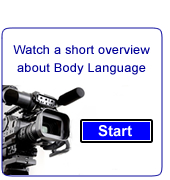
 |
"I would like to believe
in body language, but I am told if I fold my arms I am being defensive
when I know I’m not. What is the truth behind folded arms?" |
Answer - Folding
your arms means you could just be cold. Without facial expressions
to help, folded arms as a sign of body language is not much use. If
you were talking to me, and then folded your arms, moved very gently
a few inches away from me, your eye contact dropped from 80/90% down
to 50/60% and when you spoke you sounded much quieter than before,
then I would have to draw the conclusion that there was something wrong.
When several pieces of body language happen simultaneously it is called
a cluster. The arms folded, the small movement away, eyes drop and
voice drop all form a body language cluster to show there is something
wrong. However, you could have folded your arms, moved very slightly
closer and eye contact increased to 90%+ with dilated pupils and an
enthusiastic voice, then this is the opposite and would have been thought
of showing increased interest.
 |
“What are “Beady and Bambi”
eyes?” |
Answer - ‘Beady
eyes’ is a term that has been used to describe the eyes of a
person who, generally speaking, we do not trust. “I could see
it in his eyes”. Their pupils become constricted or tiny. Constricted
pupils are often used in movies to make sure that we dislike
the bad guy. (It’s done with eye-drops.) Pupils constrict when
someone is being deceitful, lying, angry or displaying negative
emotions.
Bambi eyes - When
someone is enthusiastic about something or someone their pupils
will dilate. They are reminiscent of characters in Disney films
which have big eyes. I started to use the term about 20 years
ago and it seems to have stuck with me. It's useful to see when
someone's eyes are “Bambi-like” especially during a sales visit
and even better when negotiating. It is quite useful in interviewing
as well! |
 |
Question:-I have always been
told to look someone in the eyes when talking to them, but sometimes
I feel uncomfortable and I am not sure whether this is right. |
Answer - Quite
often when we are young, parents or guardians will say “Look me in
the eye and tell me the truth.” As we grow up we believe that this
is a normal everyday part of communication, but in point of fact it
can be intimidating for others and sometimes it is difficult to keep
concentration whilst staring into someone’s eyes.
It is better to look at the whole face, as if you were
staring at something about 12 inches in front of the face, so it is looking
or gazing rather than staring. In this way you are not looking directly
into the eyes and maintaining concentration will be easier. As for the
person you are looking at, most people would feel more comfortable.
 |
"When someone is being
difficult in a meeting is it possible to use my own body language
to help calm things down?" |
Answer - it
is not too difficult to intimidate someone by staring them in the forehead.
I do this when someone is trying to be assertive or giving me a hard
time when negotiating. If you lower the volume of your voice at the
same, it invariably makes them feel uncomfortable, which can be quite
rewarding as well a bit of fun on occasions. Give it a try.

![]()
![]() Informative,
entertaining and useful. Highly recommended."
Informative,
entertaining and useful. Highly recommended."![]()
![]()
![]()
![]()
![]()
![]()
![]() "Plenty
of very useful information when\ traveling overseas. A good approach
to the subject. Highly recommended."
"Plenty
of very useful information when\ traveling overseas. A good approach
to the subject. Highly recommended." ![]()






